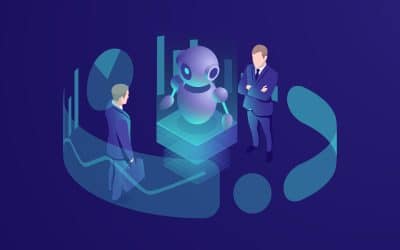In today’s fast-changing market, staying ahead of the competition demands more than innovation; it requires the implementation of Adaptive AI in Business to adapt effectively. Technology continues to alter how companies run their operations, with Adaptive AI in Business emerging as a game changer. In contrast to conventional AI technology, adaptive artificial intelligence (AI) systems can revise their code to adapt to changes in the real world that were not anticipated or even thought of when the program was initially created. Businesses that integrate flexibility and adaptability into their designs in such a way can respond quicker and more efficiently to changes.
The issue is currently being dealt with due to the advent of Adaptive AI. Adaptive AI in Business, with its capacity for continuous learning, offers more flexibility to machine learning, allowing models to adapt and evolve to the changing environment at a rapid pace. This allows us to bypass the weaknesses of traditional machine learning and more effectively address the problems presented by the ever-changing data environment. Continuous learning is a practical AI that continuously develops knowledge and improves over time. It is a significant move from static training towards an adaptive method that could significantly impact various sectors.
Are enterprises able to easily integrate flexibility and power into their business? If yes, the question is, what’s the result? With the aid of Adaptive AI in business and Artificial Intelligence Consulting Services, it is possible to improve your business’s efficiency and make it resilient enough to deal with problems quickly and efficiently in response to sudden changes. Let’s look at how adaptable AI operates and how it will benefit enterprises.
What Is Adaptive AI in Business?
Adaptive AI in business systems learns new models to respond to developments in the digital world. In addition, it is learning continuously throughout its running time with the help of new information to respond to changing conditions in the real world. Adaptive AI utilizes techniques based on sequences for data analysis instead of taking and processing data all simultaneously. It also allows users to draw inspiration from recent experiences and older predictions. In addition, it can be implemented fast since you get regular feedback on your data.
How Does Adaptive AI in Business Work?
Adaptive AI in business solutions is based on continuous learning, a crucial element in obtaining AI. Continuous learning is the capacity of a model to be taught continually using continuous data streams. This implies that the model will self-learn from new information and then adapt to the demands of changes in production. That’s why it’s often called continuous auto-adaptive learning. It is a process that simulates humans’ ability to constantly acquire, improve, and share knowledge and skills throughout their lives.
Machine learning is a method of creating models that can be used in production environments. In contrast, continuous learning lets us use information from the production setting to train the model using the new data. Continuous learning is essential for gaining accuracy and maintaining highly efficient models. Data scientists have discovered constant learning is a fantastic method for increasing model accuracy and efficiency. It also reduces the time spent training by allowing models to self-adapt.
Why Is Adaptive AI in Business Essential?
The term “adaptive” refers to the way that AI integrates a variety of tech.g., e.g., agent-based and methods (e.g. (i.e., reinforcement learning), allowing the systems to modify their behavior and learning patterns in response to changes in the real world while working.
Adaptive AI can deliver faster, more effective results by learning behavior patterns derived from interactions between humans and machines and within runtime environments. For any business involved in decision-making, it’s an essential but ever-more complex task that requires decision-making systems with greater autonomy. However, decision-making processes need to change to incorporate Adaptive AI. This could be a significant issue with existing methods, and it will require those in charge of business operations to monitor the proper usage of AI to ensure compliance with regulations.
Involve representatives from IT, business, and support department representatives to design and implement flexible AI systems. Find the application cases that require technology, offer insight into its capabilities, and determine the impacts of sourcing and the resourcing process. At a minimum, those in charge of business operations must cooperate with analytics, data AI, and software engineering techniques to construct an Adaptive AI system. AI engineering is expected to be essential in creating and implementing Adaptive AI structures.
In the end, however, adaptive systems will open up innovative ways to conduct business. This will open the way to innovative business models, products such as services, channels, and products that break down the silos of decision-making.
Benefits of Adaptive AI In Business
AI that adapts is essential to business as it can adapt, grow constantly, and improve its capabilities. It helps companies remain competitive, make data-based decisions, and provide individualized experiences. Businesses can also use consulting AI services to take full advantage of Adaptive AI.
Enhanced Decision-making
Adaptive AI in Business can analyze vast data, find patterns, and make instantaneous decisions. By adapting to changes in data and experience, the systems will provide precise and accurate insights that allow businesses to make better-informed choices.
Personalization At Scale
Adaptive AI lets businesses provide personalized services to customers on an unprecedented scale. The AI system can tailor suggestions, promotions, and even interactions based on customers’ and our preferences. It also improves customer satisfaction, engagement, and conversion rates.
Improved Operational Efficiency
Adaptive AI systems can optimize the efficiency of business processes by constantly studying data and identifying potential improvements. The systems can automate mundane tasks, enhance resource utilization, pinpoint issues or obstacles, increase productivity, and reduce costs.
Real-time Adaptation
By using Adaptive AI, organizations can react quickly to changes in market circumstances, customer demands, and internal forces. They can modify their models, algorithms, or methods based on fresh information, ensuring their actions and choices align with the present context and goals.
Proactive Problem-Solving
Adaptive AI detects and anticipates anomalies or issues before they escalate. The AI system can identify difficulties, including equipment failure, fraudulent attempts, or risks to customer churn, and monitor the data and patterns. This proactive approach allows companies to take timely proactive measures to reduce risks.
Continuous Learning And Innovation
Adaptive AI systems create an environment of continuous development and learning within the organization. They can be taught from user feedback, user interaction, and the law, allowing businesses to gain insight and opportunities and drive change in products, services, or methods.
Adaptive AI in Business: Use Cases Across Different Industries
Adaptive AI technology has a variety of possible applications across a range of sectors. Here are the most popular use cases of Adaptive AI:
Customer Service
Adaptive AI technology can be incorporated into chatbots that provide customers with personalized and effective assistance as part of customer service—the use of the natural process of language (NLP) along with machine learning. AI chatbots employ NLP and machine-learning algorithms to interpret and understand the customer’s queries by analyzing and categorizing text into specific areas to decide the most appropriate solution. They can also tailor their responses according to user’s preferences and past experiences. In other words, they may suggest goods or services related to previous purchases or respond to the user’s needs.
Multi-Channel Integration
Adaptive AI allows chatbots to connect across channels like mobile apps, websites, and social media platforms so customers can receive continuous support at all points. Continuous improvements in Machine learning algorithms allow AI chatbots to adapt to increase their efficiency over time by studying customer interactions, identifying areas for improvement, and updating their knowledge database to offer improved support in the future.
Healthcare
Adaptive AI has great potential to improve the diagnosis and treatment of diseases. Analysis of medical images: Adaptive AI algorithms can examine medical images, including X-rays, MRIs, and CT scans, to aid in identifying uses. In particular, it can identify patterns and abnormalities indicative of a specific health issue and help doctors diagnose more precisely.
Adaptive AI algorithms use patient information, like their medical history, laboratory results, and demographics, to predict future health outcomes. It can, for instance, determine the probability of a person developing a specific disease or the likelihood of the patient’s condition getting better or worsening.
Adaptive AI algorithms can customize treatment plans according to patients’ demands and improvements. For example, they could suggest specific treatments or medications depending on the patient’s medical history or alter the treatment plan when a patient’s condition changes. AI algorithms monitor patients in real time and identify any changes in their health. They can, for instance, detect vital indicators like blood pressure and heart rate to identify changes and notify medical professionals of possible problems. Adaptive AI algorithms support physicians’ clinical decision-making by analyzing large quantities of medical information and delivering suggestions for treatment and diagnosis.
Marketing
Adaptive AI can help companies tailor their marketing strategies and more efficiently target their ads. Utilizing Adaptive AI algorithms, marketers can analyze customer information, including demographics, buying behavior, and online activities, and divide their consumers into different segments. It allows marketers to focus on specific segments by sending targeted offers and messages.
The Adaptive AI algorithms use customer information to determine customers’ buying habits by identifying the segments of consumers and the likelihood of purchasing a specific product. The ability to incorporate Adaptive AI algorithms into different marketing channels, including emails, social media, and even websites. So that you can ensure that customers have an omnichannel experience at every touchpoint.
Finance
Implementing Adaptive AI into banking industry operations has become more widespread due to increased fraud risks. However, Adaptive AI isn’t limited to detecting fraud alone. Its Adaptive AI algorithms analyze vast amounts of information, such as data on employment history, credit histories, and customers’ payment habits. They predict the possibility that a borrower will repay a loan. This allows lenders to make better, more well-informed decisions on approving loans and similar rates.
Adaptive AI algorithms can detect patterns and irregularities within financial sector transactions, allowing the system to identify and stop illegal activities. For example, it could spot irregular transactions, such as large withdrawals from a client’s account, and notify institutions to be aware of fraudulent activity.
Adaptive AI algorithms look at patterns in the market and data from historical records. By comparing them, they can forecast market behavior and aid financial institutions in managing risks. It can, for instance, look at market prices and stock indicators to anticipate market developments and enable financial institutions to make better-informed investment decisions. Adaptive AI algorithms analyze customer information by analyzing common traits, like financial habits and risk profiles, for segmenting customers. Financial institutions may use the same approach to tailor their offerings to specific customers by offering specific solutions and products.
Education
Adaptive AI plays a crucial function in personalizing learning and increasing student involvement. For example, it could give personalized suggestions of educational material depending on the student’s learning style and progress and adapt its strategy when the student’s needs change. The Adaptive AI algorithms examine student data, such as performance histories and learning styles, to tailor learning materials and tasks. This allows students to receive individualized instruction according to their desires and requirements.
Financial institutions can use data such as market prices and stock indicators to make better-informed investment decisions and quickly anticipate market developments. Adaptive AI algorithms can create adaptive tests that adjust the difficulty level depending on the student’s responses. This provides an accurate evaluation of an individual’s capabilities and assists in identifying the areas where they are strong and weak. Adaptive AI algorithms monitor students’ involvement and pinpoint students at risk of falling behind. For example, it could examine student interaction with educational materials to determine those requiring additional assistance or intervention.
Management Of The Supply Chain
Adaptive AI algorithms analyze trends in the market and sales data to forecast future demand for products to help supply chain management make well-informed production, inventory, and distribution decisions. Flexible AI algorithms can optimize inventory levels according to forecasts for demand and lead times of suppliers and help supply chain management stay clear of supply shortages. The algorithm can also optimize delivery routes through traffic, delivery times, and driver schedules. This will help cut delivery time and improve efficiency.
Adaptive AI algorithms analyze data about supplier performance, delivery times, and economic indicators to determine risk throughout the supply chain. This allows supply chain leaders to take proactive measures to reduce risk and lessen disruptions’ harmful impact. The adaptive AI algorithms can determine when equipment within the supply chain is likely to break down. This allows maintenance work to be planned ahead of time to minimize downtime while reducing the effect of failures on equipment.
Retail
AI can enhance customers’ shopping experience by offering personalized product suggestions while optimizing prices and controlling inventory. AI algorithms analyze customer information, including purchase history and behavior, to classify customers with similar traits. This allows retailers to personalize their services and marketing according to each individual’s demands and preferences.
As a result, they could offer products based on the customers’ past purchase patterns, browsing behavior, or interests. These algorithms can assist customers through chatbots and virtual assistants, providing instantaneous answers to product pricing, shipping costs, and delivery details. Adaptive AI algorithms can optimize stock levels according to demand and sales data forecasts, helping retailers prevent stock shortages or overstocking.
Adaptive AI implementation techniques
Adaptive AI has a range of strategies aimed at building machines that can adapt and grow throughout a. Below are some of the techniques that are explained in depth:
Reinforcement Learning
Reinforcement Learning is machine learning in which the agent learns how to make decisions by performing actions within a setting. The agent can be given a reward or punishment for each decision, encouraging the agent to make choices that maximize rewards throughout the course. The key components are:
- The state (current environmental condition).
- The action (what the agent chooses to take).
- Rewards or penalties (feedback depending on the decision made).
The Evolution Of Algorithms
The method is based on the principles of biological evolution, such as mutation crossing, selection, and mutation. A set of possible solutions is developed, then tested, and the best-performing ones are picked. They are refined before being used in new solutions. This process is repeated to continuously improve the quality of solutions as time passes.
Fuzzy Logic
Fuzzy logic is a math technique for dealing with unclear or ambiguous data. Instead of making categorical statements (like 1 or 0, either true or false), fuzzy logic deals with partial truths, allowing for more sophisticated decision-making. Python libraries that implement fuzzy logic are fuzzy-wuzzy, fuzzy, and fuzzy-logic-python.
Other Techniques
Various additional techniques are available that can help develop flexible AI systems. These include Genetic Algorithms (which mimic natural selection), Bayesian Methods (which manage uncertainty through probabilities), and Ensemble Methods (which combine predictions of multiple models to boost overall efficiency). These methods provide a range of options for creating flexible and self-learning AI systems.
Best Practices For Implementing Adaptive AI in Business
Let’s review the most effective guidelines that an AI consultant suggests before implementing an Adaptive AI solution.
Understand The Problem
A successful training process for adaptable AI systems demands a thorough comprehension of the subject. This knowledge helps locate valid data and example training, select suitable algorithms, and establish performance indicators for assessing the system’s efficiency. Setting clear goals to guide an adaptable AI system can help it concentrate on its goals and achieve them, improving resource allocation. Realistic, precise, and quantifiable pertinent, time-bound objectives allow for assessing progress and making necessary modifications.
The correct algorithm is crucial to achieving practical outcomes with adaptable AI. Specific algorithms, including online reinforcement and algorithmic learning, work best for adaptive systems. However, their selection must be particular to the problem at hand and based on the data utilized for the training. For instance, algorithms for online learning work well with streaming data. In contrast, reinforcement-learning algorithms are typically used in decision-making problems when the system must perform a series of choices in a given duration.
Get High-Quality Data
Quality data is crucial if you are trying to build a robust, adaptable AI system that can learn from the data and generate accurate predictions. Poor-quality training data can negatively affect the AI system’s capacity to understand this issue, leading to less-than-ideal efficiency.
Variety in the training data is essential for the system to draw lessons from various instances while also being able to generalize to different situations. Diversity is vital for adaptable AI systems responding to changing conditions in the domain of concern. Furthermore, keeping a diverse learning data set allows the system to deal with new and unanticipated circumstances.
Performance Monitoring
Because an adaptable AI system works in real-time, periodic monitoring of its performance and using metrics for learning are essential to evaluate its effectiveness. Monitoring helps identify potential problems and also monitors the process of improving toward expected results and then making adjustments needed to enhance efficiency.
Algorithms can be developed to limit the effects of biases in the data used for training. In addition, explicit and transparent policies that align with how the system has been created and the procedures to ensure ethicality and fairness must be established. The system should let all stakeholders know its decision-making process and ensure they are accountable for unethical or unfair results.
Feedback Loops
Create feedback loops that collect feedback from stakeholders and customers. The feedback from these loops is crucial to improving the AI system’s adaptability. Moreover, consulting AI helps fix issues that arise and constantly improves them in response to real-world experiences.
Conclusion: The Future of Adaptive AI in Business
Adaptive AI applications are not limited to those mentioned in the previous examples. They can also help health care, resource management, and the environment. Organizations looking to implement AI ought to choose an adaptable AI to benefit from. Adaptive AI is far superior to traditional AI models in terms of performance flexibility, adaptability, and the variety of data available.
The concept of Adaptive AI isn’t an isolated technological phenomenon. It is also crucial for any business seeking to succeed in the new digital age. From personalized customer experience to improved decision-making and efficiency in operations and productivity, the advantages of Adaptive AI can be numerous. As we explore the transformational capabilities of Adaptive AI in Business, companies can benefit from AI consultation services that seamlessly integrate and enhance these intelligent systems for sustained growth. While businesses continue to embrace and incorporate this technology, they can position themselves on the cutting edge of technology, giving them a competitive edge that will help them succeed in a constantly changing and data-driven environment.











